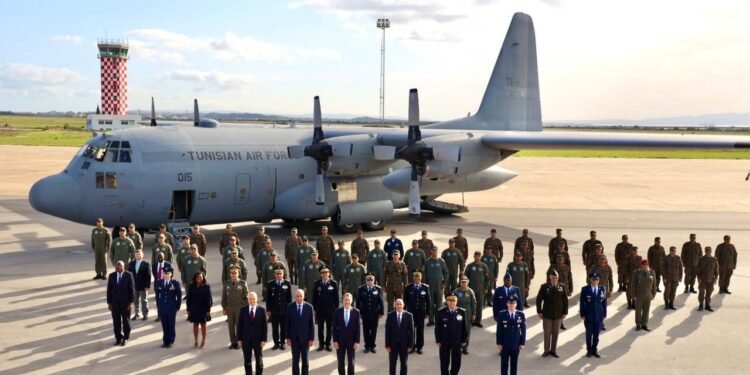ADF STAFF
The Tunisian Air Force continues to expand its transport fleet with the addition of a another C-130 Hercules plane from the United States. It is the third such plane delivered to Tunisia since 2021.
The aircraft was handed over during a November 18 ceremony at Sidi Ahmed Air Base in Bizerte, presided over by the Chief of Staff of the Tunisian Air Force, Lt. Gen. Mohamed Hajem and Defense Minister Khaled Sehili.
The delivery of the C-130H aircraft, valued at a total of 36 million Tunisian dinars ($12 million), continues to expand the Tunisian Air Force’s air transport capability, according to a U.S. Embassy statement. “This delivery is part of the U.S.-Tunisian joint strategy to increase the Tunisian Ministry of Defence and the Tunisian Air Force’s ability to provide peace and security in the region and globally.”
The Tunisian Air Force now has five C-130 Hercules aircraft in service. They join two C-130 Super Hercules — stretched versions of the plane — that were delivered in April 2013 and January 2015. Ten other Hercules are stored or preserved.
Earlier this year, the Tunisian Air Force sent two of its C-130s to Singapore for cockpit upgrades, such as large-format LCD displays, flight controls, air data and altitude sensors. Technicians also installed digital instruments, multifunctional displays, and an array of peripherals such as weather radar, a traffic collision avoidance system and advanced flight controls, defenceWeb reported. The retrofits are designed to provide improved safety, better flexibility and efficiency, and easier maintenance for pilots and crew.
The C-130 is a four-engine turboprop military transport plane that first was produced in the U.S. in 1955. Updated versions still are being made. It was designed to airlift troops over medium distances and land on short, basic airfields. It is the largest plane ever to land on an aircraft carrier. About 70 countries have acquired C-130s over the years, and more than 2,500 of the planes have been produced. There are more than 40 variations on the standard C-130. Forbes magazine has predicted that the C-130 likely will become the first military aircraft in history to stay in continuous service for 100 years.
Tunisia’s Air Force has been steadily upgrading its fleet for several years. In September, the Air Force improved its intelligence, surveillance and reconnaissance capabilities by acquiring four Textron Aviation C-208B Grand Caravan EX aircraft from the U.S. This strategic addition aims to strengthen Tunisia’s ability to address national and regional security challenges, Military Africa reported. The Tunisian Grand Caravan EX planes are configured for intelligence missions, with night vision capabilities and other sophisticated surveillance equipment. Although unarmed, these aircraft are designed to provide critical real-time data and intelligence, improving Tunisia’s ability to monitor and respond to threats.
The $54 million deal had a comprehensive support package with spare parts, flight training, technical drawings, logistics support and ground support equipment. This ensures that the Tunisian Air Force can maintain and operate the aircraft effectively.
In July 2023, the Air Force took delivery of the first four of eight Beechcraft T-6C Texan II trainers. Times Aerospace reported that the training aircraft were essential to Tunisia’s aviation modernization plans up to 2030. The planes are assigned to a squadron at Sfax air base and will help strengthen security along the southern border and thwart cross-border smuggling and terrorism.









